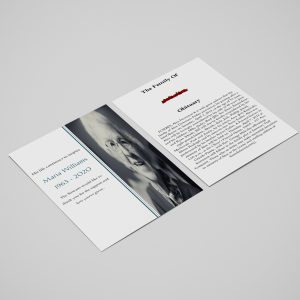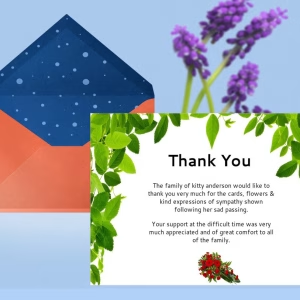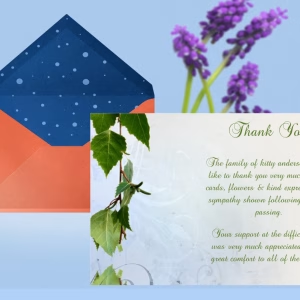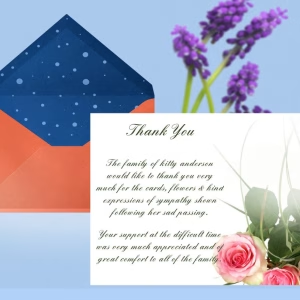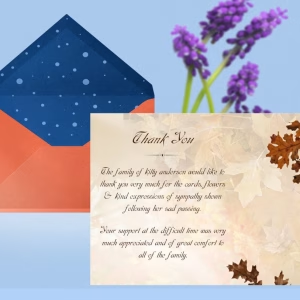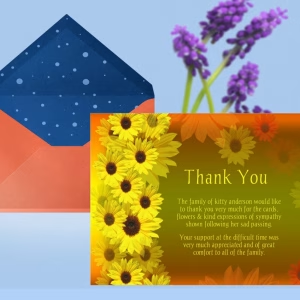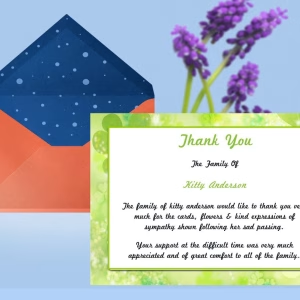In the aftermath of a funeral, sending thank you cards is a thoughtful gesture that allows you to express gratitude to those who supported you during a difficult time. However, many people are uncertain about the appropriate timing for sending these cards. This guide will help you understand the best practices for sending out thank you cards after a funeral, ensuring that your expressions of appreciation are timely and meaningful.
Importance of Sending Thank You Cards After a Funeral
Sending thank you cards after a funeral is more than just a courtesy; it is a way to acknowledge the kindness and support offered by friends, family, and others during a time of grief. Whether they sent flowers, made a donation, provided meals, or simply offered comforting words, these gestures can make a significant difference in your ability to cope with loss.
Thank you cards allow you to personally recognize each act of kindness, letting people know that their efforts were appreciated. It also helps to maintain connections with those who have been there for you, strengthening bonds that can provide ongoing support as you continue to navigate your grief.
When to Send Out Thank You Cards for Funeral: General Timeline
Within Two to Three Weeks
The general recommendation is to send out thank you cards within two to three weeks after the funeral. This timeframe is considered respectful and timely, allowing you to express your gratitude without unnecessary delay. It also ensures that the memory of the gestures you are thanking people for is still fresh in everyone’s minds.
Exceptions to the Timeline
While two to three weeks is ideal, there are circumstances where it might be appropriate to extend this timeframe. Grieving can be an overwhelming process, and it’s important to give yourself permission to take the time you need. If you are unable to send thank you cards within the suggested period, sending them within a month or even six weeks is still considered acceptable. The key is to ensure that the thank you cards are sent when you feel emotionally ready to handle the task.
Factors That Influence When to Send Thank You Cards
Size of the Funeral
The size of the funeral and the number of people you need to thank can impact how quickly you can send out thank you cards. Larger funerals with many attendees, flower arrangements, and donations may require more time to individually acknowledge each gesture. In such cases, it’s understandable if the thank you cards take a bit longer to be sent.
Emotional Readiness
Grieving is a deeply personal process, and emotional readiness plays a significant role in when you can start writing and sending thank you cards. Some people may find comfort in completing this task soon after the funeral, while others may need more time before they feel ready to take on the responsibility.
Help from Family or Friends
If you’re finding it difficult to manage the task of sending out thank you cards, consider enlisting the help of family members or close friends. They can assist with addressing envelopes, writing notes, or simply offering support as you go through the process. Sharing the task can make it more manageable and ensure that the cards are sent out in a timely manner.
What to Include in a Funeral Thank You Card
Personal Touch
Each thank you card should include a personal touch, whether it’s a handwritten note or a specific mention of the gesture you’re acknowledging. For example, if someone sent flowers, you might say, “Thank you for the beautiful flowers you sent in memory of [Name]. They brought comfort to us during a difficult time.”
Acknowledgment of Specific Gestures
It’s important to mention the specific act of kindness you are thanking the person for. Whether it’s for attending the funeral, providing meals, or making a donation, acknowledging the specific gesture adds a personal element to the card.
Expressing Gratitude
While the thank you card is primarily about expressing gratitude, it’s also an opportunity to let people know how much their support meant to you. A simple statement like, “Your support meant the world to us during this challenging time,” can convey the depth of your appreciation.
Who Should Receive Thank You Cards After a Funeral?
Immediate Family Members
Immediate family members who played a significant role in the funeral arrangements or provided substantial support should receive a thank you card. This includes siblings, parents, children, and spouses who went above and beyond in their assistance.
Friends and Extended Family
Friends and extended family members who attended the funeral, sent flowers, made donations, or provided other forms of support should also receive a thank you card. These gestures, no matter how small, deserve acknowledgment.
Clergy and Funeral Home Staff
Don’t forget to send thank you cards to the clergy who officiated the service and the funeral home staff who helped with the arrangements. Their professionalism and care are vital in making the funeral a respectful and memorable event.
Pallbearers and Musicians
If pallbearers, musicians, or anyone else provided specific services during the funeral, they should receive a thank you card as well. Acknowledging their contributions shows that you appreciated their role in the ceremony.
How to Address the Challenge of Sending Thank You Cards
Prioritize the Task
It can be challenging to find the time and emotional energy to write and send thank you cards after a funeral. However, prioritizing this task can help you complete it in a timely manner. Set aside a specific time each day or week to work on the thank you cards, and focus on completing a few at a time.
Pre-Written Templates
Using pre-written templates or phrases can help you get started, especially if you’re struggling with finding the right words. You can personalize these templates with specific details about the person you’re thanking and the gesture you’re acknowledging.
Enlist Help
As mentioned earlier, don’t hesitate to ask for help from family or friends. They can assist with writing, addressing envelopes, or simply providing moral support as you work through the thank you cards.
Tips for Writing and Sending Funeral Thank You Cards
Use Quality Stationery
Choose quality stationery that reflects the solemnity and importance of the occasion. Many people opt for cards that are simple and elegant, with a tasteful design that complements the message of gratitude.
Keep the Message Simple
Your message doesn’t need to be lengthy or elaborate. A simple, heartfelt expression of thanks is often the most effective. Focus on the sincerity of your words rather than the length of the message.
Send Cards in Batches
If the task feels overwhelming, consider sending the thank you cards in batches. This approach allows you to manage the task more easily, ensuring that you don’t feel rushed or stressed.
Don’t Worry About Perfection
Remember that your thank you cards don’t have to be perfect. What matters most is that you take the time to express your gratitude. The people you’re thanking will appreciate the gesture, regardless of any small imperfections.
The Right Time to Send Funeral Thank You Cards
Sending thank you cards after a funeral is a meaningful way to express your appreciation for the support and kindness shown by others during a difficult time. While the ideal timeframe is within two to three weeks, it’s important to remember that your emotional readiness and circumstances play a significant role in determining when to send them. By prioritizing this task and enlisting help if needed, you can ensure that your thank you cards are sent in a timely and thoughtful manner, helping to maintain the bonds of support and comfort that were offered to you in your time of need.
Funeral Thank You Card Template
-
Searching for a Simple Funeral Thank You Card Template that is easy to print and amass and that has a cutting-edge look? This Simple Funeral Thank You Card Template is the Perfect decision that is having a measure of 8.5”x 5.5”.
- No Limitation on Content, Edit anything
- Edit anytime – unlimited revisions even after purchased
- Get printable PDF downloaded to get it printed your own.
-
Searching for a Green Leaf Thank You Card template that is easy to print and amass and that has a cutting-edge look? This Green Leaf Thank You Card Template is the Perfect decision that is having a measure of 5.5”x 8.5”.
- No Limitation on Content, Edit anything
- Edit anytime – unlimited revisions even after purchased
- Get printable PDF downloaded to get it printed your own.
-
Searching for a Natural Thank You Card Template that is easy to print and amass and that has a cutting-edge look? This Natural Thank You Card Template is the Perfect decision that is having a measure of 5.5”x 8.5”.
- No Limitation on Content, Edit anything
- Edit anytime – unlimited revisions even after purchased
- Get printable PDF downloaded to get it printed your own.
-
Searching for a Pink Rose Thank You Card Template that is easy to print and amass and that has a cutting-edge look? This Pink Rose Thank You Card Template is the Perfect decision that is having a measure of 5.5”x 8.5”.
- No Limitation on Content, Edit anything
- Edit anytime – unlimited revisions even after purchased
- Get printable PDF downloaded to get it printed your own.
-
Searching for a Autumn Thank You Card Template that is easy to print and amass and that has a cutting-edge look? This Autumn Thank You Card Template is the Perfect decision that is having a measure of 5.5”x 8.5”.
- No Limitation on Content, Edit anything
- Edit anytime – unlimited revisions even after purchased
- Get printable PDF downloaded to get it printed your own.
-
Searching for a Floral Thank You Card Template that is easy to print and amass and that has a cutting-edge look? This Floral Thank You Card Template is the Perfect decision that is having a measure of 5.5”x 8.5”.
- No Limitation on Content, Edit anything
- Edit anytime – unlimited revisions even after purchased
- Get printable PDF downloaded to get it printed your own.
-
Searching for a Irish Green Thank You Card Template that is easy to print and amass and that has a cutting-edge look? This Irish Green Thank You Card Template is the Perfect decision that is having a measure of 5.5”x 8.5”.
- No Limitation on Content, Edit anything
- Edit anytime – unlimited revisions even after purchased
- Get printable PDF downloaded to get it printed your own.
Funeral Programs : Helping Videos
Frequently Asked Question On When To Send Out Thank You Cards For Funeral
When is the best time to send out thank you cards after a funeral?
The ideal time to send out thank you cards is within two to three weeks after the funeral. This allows you to acknowledge the support and kindness of others while the memories are still fresh. However, if you need more time due to grief or other circumstances, sending them within a month to six weeks is still acceptable.
Who should receive thank you cards after a funeral?
Thank you cards should be sent to anyone who provided support during the funeral, including those who attended the service, sent flowers, made donations, provided meals, or offered other forms of assistance. This also includes clergy, funeral home staff, pallbearers, musicians, and anyone who contributed to the arrangements.
What should I write in a funeral thank you card?
A funeral thank you card should include a personal message of gratitude. Acknowledge the specific gesture, such as attending the funeral, sending flowers, or providing support, and express your sincere appreciation. The message doesn’t need to be long; a few heartfelt sentences are enough.
Is it okay to ask for help with writing thank you cards?
Yes, it’s perfectly fine to ask for help from family or close friends. They can assist with writing, addressing envelopes, or organizing the cards. This can be especially helpful if you’re overwhelmed or need additional support during this emotional time.
What if I forget to send a thank you card to someone?
If you realize that you forgot to send a thank you card to someone, it’s never too late to correct the oversight. You can send a card as soon as you remember, and include an apology for the delay. Most people will understand, especially given the emotional circumstances.


